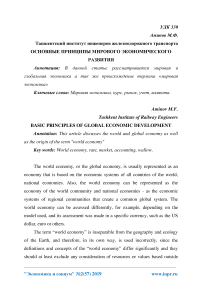Basic principles of global economic development
Автор: Aminov M.F.
Журнал: Экономика и социум @ekonomika-socium
Рубрика: Современные технологии управления организацией
Статья в выпуске: 2 (57), 2019 года.
Бесплатный доступ
This article discusses the world and global economy as well as the origin of the term "world economy"
World economy, rate, market, accounting, wallow
Короткий адрес: https://sciup.org/140241706
IDR: 140241706
Текст научной статьи Basic principles of global economic development
The world economy, or the global economy, is usually represented as an economy that is based on the economic systems of all countries of the world, national economies. Also, the world economy can be represented as the economy of the world community and national economies - as the economic systems of regional communities that create a common global system. The world economy can be assessed differently, for example, depending on the model used, and its assessment was made in a specific currency, such as the US dollar, euro or others.
The term “world economy” is inseparable from the geography and ecology of the Earth, and therefore, in its own way, is used incorrectly, since the definitions and concepts of the “world economy” differ significantly and they should at least exclude any consideration of resources or values based outside the Earth. For example, while attempts could be made to calculate the cost of untapped mining capabilities in unclaimed territory in Antarctica at the present time, the same capabilities on Mars will not be considered part of the global economy - even if these capabilities were being realized now - and could be considered only in the same way as uncreated intellectual property.
Without taking into account the minimum limit described above regarding the creation of value in the process of production, consumption and exchange on planet Earth, the definitions, representations, models and estimates of the world economy vary considerably.
Since it is common to limit the issues of the world economy exclusively to human business activity, the world economy is usually valued in monetary terms, even in cases of lack of an effective market to evaluate certain goods or services, or in cases where there is a lack of independent research or lack of cooperation with side of the government makes such an assessment difficult. Typical examples are illicit drugs and other black market products that, by any standard, are part of the global economy, but for which, by definition, there is no legal market in any form.
However, even in cases where there is a transparent and efficient market in order to establish a monetary value, economists usually do not use the current exchange rate or official exchange rate to convert the monetary units of this market into a unit of assessment of the global economy, since exchange rates often do not reflect international value, for example, in cases where the volume or price of transactions is regulated by the government.
Therefore, as a rule, the method of estimation based on the purchasing power of currencies is used to convert the national market monetary units into a single currency for assessing the global economy. This method is used to evaluate international business activity in terms of real cash income. However, the global economy can be appreciated and expressed in many more ways. In this case, however, it remains unclear, for example, how many of the 7.0 billion people in the world have most of the business activity, calculated using the described assessment methods.
Thus, in 2011, the largest economies in the world (with a volume of more than 2 trillion dollars or 1.25 trillion euros), taking into account estimates based on nominal GDP are: USA, China, Japan, Germany, France, Great Britain, Brazil, and Italy. The largest economies of the world (with a volume of more than 2 trillion dollars or 1.25 trillion euros) using the purchasing power parity estimation method (PPP) were the USA, China, Japan, India, Germany, Russia, Great Britain, Brazil, and France .
Список литературы Basic principles of global economic development
- Pankov, V. S. Globalization of Economics//World Economy and International Relations. -2011
- World economy forecast to 2020; by ed. Acad. A. A. Dynkin. M.: Master, 2006


